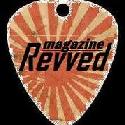
(click on picture to open file)
By: Michael D. Vogel
© Aprl 25, 2000. Michael D. Vogel. All Rights Reserved.
Published in:
Aggro-Active magazine – May 12, 2000
Anyone who has interacted with Kevin Vargas, PD of KISS San Antonio, knows him to be a consummate professional in every way. He immediately earns the respect, not only because of his undying passion of Active Rock radio, but also for his dedication to building the station into the powerhouse it has become.
A seasoned veteran within Rock Radio, Kevin got his start in college radio in 1976 and then quickly jumped to commercial radio a year later at KIIK Quad Cities. “There’s only one date that I remember like it was yesterday, and that would be October 10th, 1977–the very first time I cracked a commercial mic.” From there he went to WWCT Peoria, then made the big move to KWHL Alaska, then KKLZ Las Vegas and WAZU Dayton when it was known as “The Big Wazoo.” After stops at Virginia Beach’s “The Fox”, and with Bryan Shock in Annapolis, Vargas joined Virgil Thompson in San Antonio.
As Kevin and I got to talkin’, it wasn’t hard to see that he is still as passionate about radio today as when he opened the mic for the first time, but also realizes that a specific set of market circumstances can dictate how adventurous a station can be. He understands the type of listener the format attracts and the special challenges that go with it, and that the rewards can ultimately be tremendous. The proof is in the pudding–KISS was #2 in the market with an 8 share and the #2 local biller.
As the format continues to search and identify its proven path to success, Vargas reminds us of the one cornerstone concept that helped kickoff this format to begin with–meeting and delivering the expectations of the listener. Done properly, this philosophy can create a constant positive stream of ambassador’s for your station. Frankly, it’s a concept that all radio should try and incorporate into their mission statement.
What are some of the issues facing Active Rock Radio today?
Kevin Vargas: “The biggest issue facing the format would be a further fragmentation of the life groups. Some Active Rock stations lean to the ‘extreme side’ of music where bands such as Pantera are much more valuable than a band such as Rush. On the other side of the coin are the stations where bands such as Aerosmith, Scorpions and Queensryche are essential core artists. And this is going to be influenced as well by how viable the long-term shelf life will be for niche genres like Rap Rock. We are faced with an issue of whether the format should be sub-divided once again.
“A couple of years ago, when Alternative Radio trumpeted the electronica and ska bands like Prodigy and Reel Big Fish, it was less of an issue because there was much more differentiation of product. And now, so many Alternative stations have embraced some of the traditionally exclusive artists for Active Rock. A great example of this is Metallica. How many Alternative stations two years ago truly played Metallica, where as now, it’s not uncommon. The alternative format has gotten away from the dance sound and back to the guitar. As a result, these stations become a lot more similar sounding.”
Then what is the difference between the two formats?
KV: “Active Rock leans more male targeted whereas Alternative will have more of a 50/50 or even in some cases be skewed more towards the targeted female demo. Sound wise, Alternative Radio adds a little more pop and dance elements than Active Rock. It also depends on the situation in the market.
“The other big challenge facing the format is having a sales staff that understands the demos the station is targeting. As stations lean to the extreme and start garnering the younger end of the 18-34 demo, it becomes imperative for the sales staff to truly understand the life group, understand the lifestyle and ultimately knows how to deliver the audience to the appropriate clients who have the products they want and/or needs.
“It’s about having a sales staff and sales manager who truly get what the format is all about, and to champion that audience. It can’t be just beer and soda commercials any more. If you’re selling airtime, and the client has no concept as to why this is a vital buy, you won’t be able to progress and you’ll ultimately be out of business. Too many advertisers are quick to just place 25-54 demo and more often, woman 25-54.
“That will always be an issue any time music starts to lean a little farther away from the mainstream. Even though a lot of what is now considered mainstream for some people and some markets is going to be in the extreme for others. But, by its own definition, extreme does not mean extreme.”
As Active Rock embraces harder-edged bands–those who use controversial and sometime violent lyrics–what type of responsibility does radio have to its listeners?
“I think it’s defined by market standards. Each station knows how far they can go and what they can get away with. Shock simply for the point of shock has no artistic value.
“Any jock can talk blue and dirty. If you’re just trying to get a reaction out of people, because that’s your intention, then so be it. But let’s be realistic, any idiot can open the mic and say, ‘fuck.’ The trick is to be clever about it. When you are sticking your neck out over the line, then it better have a purpose. And most importantly, the drive you are taking people along on had better be a ride that they want to go on. Otherwise what’s the point?
“For example, musically, a song like ‘Nookie’ obviously contains a lot of drop-outs, but even so, the integrity of the song is not lost. Whereas a song like ‘Break Stuff’ is one big edit after another. In the end, you lose the anger and emotion of the song because of the drop out. It doesn’t take a lot of talent to spew obscenities, but it does take talent to create a lyrical line that makes you say, ‘Oh man, I get that. I can so relate to that!’
“It is also important to remember where people tend to listen the most. How would the buyers or the at-work listeners feel about such language coming from their monitors and speakers? Classic Rock has had a tremendous rise over the past few years, because it is very safe, and in some cases so familiar, that it’s almost a background. You can just leave it on in the background; sing along when you wish, all the while, never really being challenged musically. So one of the great battlefields for the format is the office. Looking at the successful Active Rock stations, they have a good amount of at-work listening. If the battle is important to you, you’d better make decisions that affect the ability for mass consumption. But that doesn’t mean you have to go vanilla, you just need to use a little common sense and ask yourself if the return is worth the risk.
“The bottom line is this; we are out to create a station people care about. Provide a musical product that fulfills the expectations of the audience every time they turn it on, and a talk element that that is compelling, entertaining and informative. No matter how safe or how blue it is, if it doesn’t achieve those goals, you are wasting your time.”
How do you go about branding your listeners in order to maximize the impact the station has with them?
“Branding is essential, no matter what your product is. What makes it even more life or death in radio is the system that judges our business, Arbitron, is measuring recall, not actual listening. So, without that brand, without that identity, you’re falling behind even before you get out the gate. We’re fortunate because we are a station that has one of the most recognizable brand names in Rock–not only in this market, but in this country. There is only one, with apologies to all the conglomeration of the alphabet soup that makes up KISS. The last time I checked in Webster’s, it was spelled K-I-S-S. In the words of the Highlander, ‘There can be only one.’”
Do you feel that competition within the business has become so fierce that one really has to employ the most aggressive promotional and marketing tactics in order to attract and maintain the listening audience?
“Absolutely! Commitment is the key and nothing says that more than Cox Radio’s understanding of the value of research and marketing dollars. I have heard the horror stories of budgets being slashed, and being told to do more with less, and in some cases, do without. Fortunately, that is not a fear here. The key area of investment with a Cox station is research. The philosophy is simple–target an audience, finds out what the audience wants, create a product that fulfills their expectations and then tell everyone it’s out there. It’s really marketing 101 and should be the M.O. for any successful radio station.
“Marketing needs to stay top of mind. We are in a business that’s measured when people are asked what they listen to. In a perfect world, diaries would be filled out while they are listening. In the imperfect world, and reality, recording what you’ve listened to occurs at the end of the day. Anything you can do to reinforce the brand means you might be the one they think of first.”
Do you have a particular programming philosophy that you adhere to?
“Best intentions of the station first. What it really comes down to are well-executed research projects. We put the PD, the OM, the GM and the GSM along with the consultant and the research team from corporate and develop a plan. After dissecting the information, we’ll take advantage of the opportunity by utilizing every resource we have. Mentally, this ‘win as a team’ philosophy is at the core of the Cox philosophy.”
Describe your relationship with your staff.
“Everyone is here because they want to be here–they want to be a part of KISS. They still get off cracking the mic and hearing their name next to those legendary call letters. Besides, we still truly love, not only the job but, the music we are playing as well.”
When you love what you’re doing you really feel alive.
“That is essential. I think if you’re an Active Rock station and someone on staff just doesn’t get in to what your doing–if they have no desire to see any of the bands your playing or if they have never really listened to a CD to the point of knowing what the song is about–then the station is defeating itself. The Active Rock audience can smell a phony and spot insincerity a mile away.
“The 18-34 demo right now is a peer culture, not a parental culture. They don’t want to be told that they are supposed to like something; they want to be informed as to why they might like it. And if you are the seller, then you’d better like it, too.”
KISS’s playlist contains a lot of new artists. Do you feel you have to hit the new artists quicker and harder to own them in the market?
“I think that’s one of the greatest myths in general. Until an artist has identity, the segment of the audience who knows of and can identify the artist is very small. So the station that played them first is relatively unimportant. Very few listeners are out there keeping a scorecard to use as a decision making tool.
“Playing a record one week prior to your competition has comparatively little return. Most people base listening decisions on what’s on the radio ‘now’. If a Metallica fan hears the new song on station ‘A’, they’re not going to turn it off just because station ‘B’ played it 10 times before station ‘A’. Being the Metallica station because you deliver the expectations of playing the best Metallica songs more often, has the greatest value.
“One of the greatest hindrances to any Program Director is the unwillingness to let go of the past. The mentality is ‘we played it then, so we should always play it.’ If your audience says they don’t like it (i.e. a band or song) anymore, or their taste has evolved away, then you need to reconsider your position and let it go. That is another issue facing a lot of Active Rock stations these days. How viable are the Scorpions, Van Halen and Rush? I can think of a time when Huey Lewis & The News was the most played artist at Rock Radio. There were also the periods where Bon Jovi and Hootie & The Blowfish were essential. The question is, how many of these bands will have the staying power to fit the evolving format?”
With the needs and concerns of the listening audience constantly changing, how are you able to build such a strong synergetic environment?
“Our General Manager, Caroline Devine, has always held a philosophy of each team–everyone exists as these little ships where each team has planks that go from your ship to the next one without drowning–the more you’re connected with these planks, the better off you’re going to be. In order to achieve the best results, it is imperative for each department to back each other up so that no one is doing anything away from the strategic plan. KISS programming understands the need and concerns of the KISS sales staff and vice-versa. The promotion staff then puts it all together and juggles the needs of both. The GSM and the traffic manager have to be able to clear the inventory as well as recognize and maximize potential revenue. Everybody needs to understand where the others priorities are.
“All the stuff we do is very simple. We just have good people, from top to bottom, who are focused on execution in addition to meeting not only the individual goals but also those of our teammates. Again, the bottom line is this, we either win as a team or we lose as a team.”
What type of summer festivals and promotions do you have lined up?
“The Texas summer lifestyle consists of drinking beer, watching the grass grow, barbecuing and tubing. With all the great rivers around San Antonio, tubing has become quite the phenomenon. Tens of thousands of people hang out by the rivers every weekend.
“We also do regular KISS concerts billed as the KISS Concert Series. We’ll put on as many shows as we can find bands to accept our offers. But the main objective is to keep the KISS Prize Pig Patrol on the streets as much as possible and simply go to where our listeners are. Sometimes we do these pre-promoted and at other times we simply just show up. It’s all about rock ‘n roll and its lifestyle. If you don’t get it, get out of the format!”
Street image–what are you trying to promote out there?
“We’re very aggressive. Our goal is to be everywhere you want to be. We go places that matter to our audience and sometimes there are sales generated. If you go to a particular retailer and they’re offering a great special, and you’re in the market to purchase that product, then that is obviously the place to be. Other times, they may not have anything to do with generating revenue. It’s just the right place to be to touch your audience.
“We send the Prize Pig Patrol out regularly to places that have zero potential for ever generating revenue, but great potential for creating fans. The greatest contributor to the success of any radio station, is the fan. The person who is a prize pig who may win everything in sight and the annoying person who always wants to talk about the same band share a similar passion about your radio station and if they get an Arbitron diary, they’re the ones who will take the pencil and drag it right down the page. Both types demonstrate that it is a part of their lives and are therefore proud to tell the world that this is their station.
“You have to create fans. That is the one advantage Active Rock has, the format is such a mood function. The choice of your radio station is a mood function. These people come to us, not for background, not because they’re disenfranchised, it’s because they love the music and the presentation of the station. That is the key to our success. So we take the Prize Pig Patrol to places that matter to them. For example, the city parks are a great place to help cultivate listeners. Families that don’t have a lot of disposable income find the park to be a tremendously affordable gathering place. We go out to these locations with a bag of goodies, a bunch of stickers and some other free stuff, plus we get some clients to come in, and we have created a winning situation for everyone.
“People just can’t believe you’re showing up in their neighborhood, just to give them something. The look on people’s faces when they get something unexpected is priceless. That’s how you create fans!
“Anytime I see someone with a KISS shirt on, I’ll grab a few CDs from my car and give them to them. How often does someone stop you and thank you for supporting something? This is no contest; it’s about recognizing the individual. The passion carries when that person tells people about what happened. The end result, you have just created an ambassador for your radio station. The end result is that you are top of mind when they fill out the diary. There is a reason products like Coca-Cola and Budweiser are on top. If the listener has only positive and sometimes unexpected memories of the station, then that will be positively reflected in their Arbitron diary.” ^m^
Photograph credit: Kevin Vargas Website:
© Aprl 25, 2000. Michael D. Vogel. All Rights Reserved. This originally appeared on the Vogelism blog at https://www.vogelism.com, authored by Michael D. Vogel. This article may be shared or reprinted as long as the entire copyright message, including the source location of this article, accompanies it.
















 Welcome to Michael D. Vogel’s online portfolio. I am a Los Angeles-based music journalist/content creator, and self-professed music-fanatic/radio-aholic. With more than 20 years of experience in multiple facets of the music industry including; music programming/air talent for terrestrial and internet radio as well as record label artist promotion, I have a finger on the pulse of what's new and under the radar in the emerging music scene. Areas of specific expertise include, but not limited to: rock (heritage, mainstream, heavy metal/hard rock and alternative), pop and adult contemporary, as well as radio, pop culture, sports, exercise and politics. I am applying my passion for music as a freelance writer for the Examiner as National Music Examiner (Examiner.com) in addition to West Coast Editor for FreeGotham (FreeGotham.com). Find me at michael@vogelism.com.
Welcome to Michael D. Vogel’s online portfolio. I am a Los Angeles-based music journalist/content creator, and self-professed music-fanatic/radio-aholic. With more than 20 years of experience in multiple facets of the music industry including; music programming/air talent for terrestrial and internet radio as well as record label artist promotion, I have a finger on the pulse of what's new and under the radar in the emerging music scene. Areas of specific expertise include, but not limited to: rock (heritage, mainstream, heavy metal/hard rock and alternative), pop and adult contemporary, as well as radio, pop culture, sports, exercise and politics. I am applying my passion for music as a freelance writer for the Examiner as National Music Examiner (Examiner.com) in addition to West Coast Editor for FreeGotham (FreeGotham.com). Find me at michael@vogelism.com. 